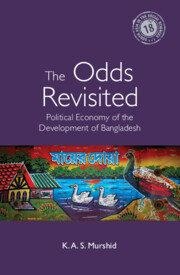Book contents
- Frontmatter
- Dedication
- Contents
- List of Tables and Figures
- Acknowledgements
- List of Abbreviations
- Introduction
- 1 A Bird’s-Eye View of the Bangladesh Economy: 1971–2020
- 2 Initial Conditions: The Odds Revisited
- 3 The Food Security Challenge
- 4 Exploring Transition and Change in the Rice Market
- 5 International Migration
- 6 The Rural Non-farm (RNF) Sector
- 7 Industrialization and the Rise of RMG
- 8 Industrialization: Other Stories
- 9 The Social Sector Puzzle
- 10 Dhaka: Capital Formation—Urbanization, Competition and the Rise of a Business Class
- Conclusion
- Notes
- Glossary
- References
- Index
Introduction
Published online by Cambridge University Press: 30 June 2022
- Frontmatter
- Dedication
- Contents
- List of Tables and Figures
- Acknowledgements
- List of Abbreviations
- Introduction
- 1 A Bird’s-Eye View of the Bangladesh Economy: 1971–2020
- 2 Initial Conditions: The Odds Revisited
- 3 The Food Security Challenge
- 4 Exploring Transition and Change in the Rice Market
- 5 International Migration
- 6 The Rural Non-farm (RNF) Sector
- 7 Industrialization and the Rise of RMG
- 8 Industrialization: Other Stories
- 9 The Social Sector Puzzle
- 10 Dhaka: Capital Formation—Urbanization, Competition and the Rise of a Business Class
- Conclusion
- Notes
- Glossary
- References
- Index
Summary
The story of Bangladesh is an extraordinary tale of struggle against immense odds. It is the story of a nation state that broke into the world stage dramatically after an armed struggle against what became viewed as an occupation army attempting to remain in power through massive repression and large-scale killings that sent over 10 million people into India to seek shelter and refuge. Before these events, Bangladesh was an unremarkable part of Pakistan (East Pakistan) whose main value for the ruling elite was its jute exports that enabled the country to earn valuable foreign exchange – much of which was appropriated for investment in West Pakistan, especially in the emerging industrial sector there. Bangladesh was overwhelmingly rural and agricultural with a high population density and massive illiteracy, malnutrition and poverty. This is where it was stuck: as the rural backwaters located in the biggest delta in the world periodically visited by violent storms and floods, and debilitating epidemics. This state of affairs continued, largely unchanged over 24 years since gaining independence from Britain in 1947, until the country broke away from West Pakistan and became Bangladesh in 1971.
While the economy remained stagnant as part of Pakistan, the same cannot be said of its politics. A nascent but vocal middle class emerged, consisting of students, teachers, lawyers, journalists and government officers. This group was strengthened by an emerging industrial working class – all largely drawn from the ranks of the peasantry, including surplus peasants. This served to challenge the traditional political power structure, which was dominated by feudal elements under the banner of the Muslim League – the party that was instrumental in the creation of Pakistan (Jalal 1994; Naqvi 1986). This newly emerged middle class became the logical political base of the Awami League (AL) formed from a breakaway group of the Muslim League. The AL adopted a distinctly more democratic, secular and ‘progressive’ stance compared to the Muslim League and quickly drew a large following from the new, aspiring middle classes.
It was therefore only a matter of time when the disparity and inequality between the two ‘wings’ of Pakistan would become apparent, which, combined by the reluctance of the ruling military–bureaucratic–feudal elite based in the west to share power with the east, did not bode well.
- Type
- Chapter
- Information
- The Odds RevisitedPolitical Economy of the Development of Bangladesh, pp. 1 - 7Publisher: Cambridge University PressPrint publication year: 2022

